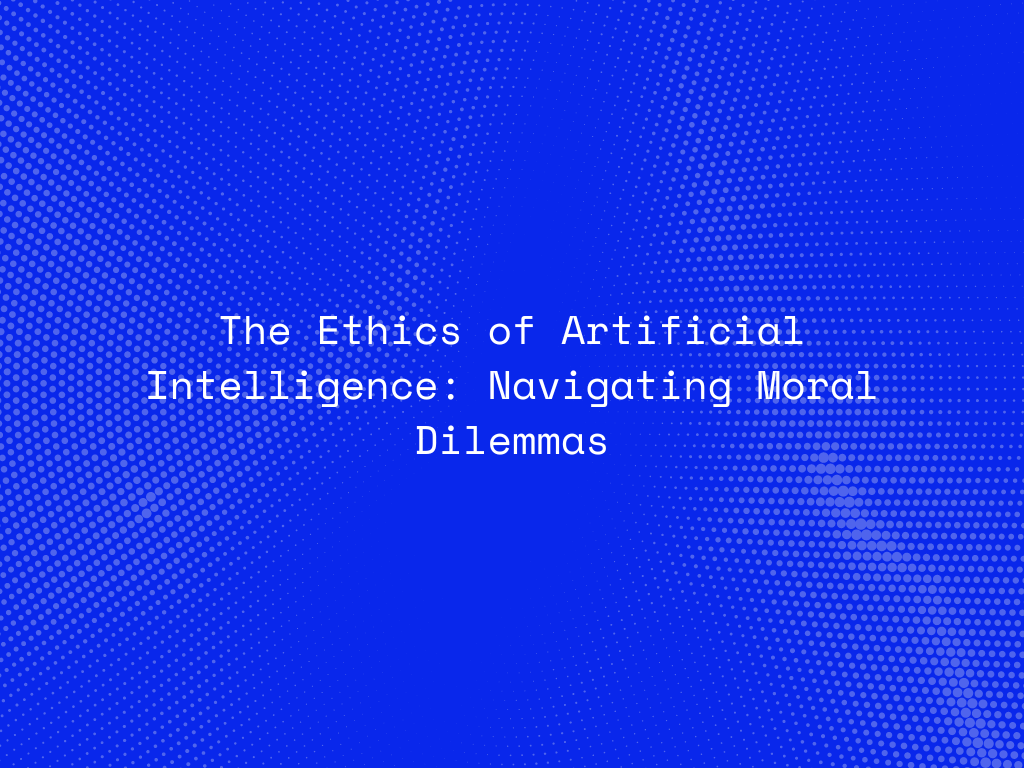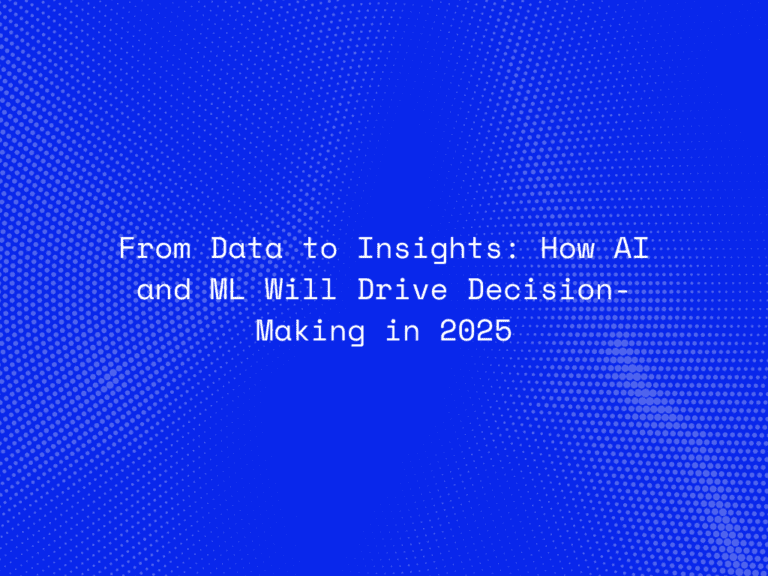As artificial intelligence (AI) becomes increasingly integrated into our daily lives, it brings with it a host of ethical questions and moral dilemmas. From autonomous vehicles to predictive policing, AI systems are making decisions that have significant impacts on society. While AI has the potential to greatly benefit humanity, it also poses challenges that must be carefully managed to ensure that these technologies are developed and deployed responsibly. In this blog, we will explore the key ethical concerns surrounding AI, discuss the moral dilemmas that arise, and consider how we can navigate these complex issues to create a future where AI serves the greater good.
Understanding the Ethical Concerns of AI
The ethical implications of AI are vast and multifaceted, touching on areas such as privacy, bias, accountability, and transparency. As AI systems are increasingly used to make decisions that affect people’s lives, it is essential to consider the following ethical concerns:
-
Bias and Fairness
- Algorithmic Bias: AI systems can perpetuate and even exacerbate existing biases present in the data they are trained on. This can lead to unfair outcomes, such as discrimination in hiring, lending, and law enforcement.
- Fairness: Ensuring that AI systems make decisions that are fair and equitable across different demographics is a significant ethical challenge. This includes addressing issues of racial, gender, and socioeconomic bias in AI algorithms.
-
Privacy and Surveillance
- Data Privacy: AI systems often rely on vast amounts of personal data to function effectively. The collection, storage, and use of this data raise concerns about privacy and the potential for misuse.
- Surveillance: The use of AI in surveillance technologies, such as facial recognition, has sparked debates about the balance between security and individual privacy. There is a risk of creating a surveillance society where people’s movements and behaviors are constantly monitored.
-
Autonomy and Control
- Human Autonomy: AI systems can influence human behavior in subtle ways, raising questions about the extent to which individuals can maintain autonomy over their decisions and actions.
- Control Over AI: As AI systems become more autonomous, there is a growing concern about the loss of human control over these technologies. Ensuring that humans remain in control of AI systems, especially in critical applications like military or healthcare, is essential.
-
Accountability and Transparency
- Responsibility: When an AI system makes a mistake or causes harm, determining who is responsible can be challenging. This raises questions about accountability, particularly in cases where AI decisions lead to negative outcomes.
- Transparency: AI systems, particularly those based on deep learning, are often seen as “black boxes” due to their complexity and lack of interpretability. Ensuring that AI systems are transparent and that their decision-making processes can be understood by humans is crucial for building trust.
-
Job Displacement and Economic Impact
- Automation and Employment: The rise of AI and automation has led to concerns about job displacement, as machines increasingly take over tasks previously performed by humans. This raises ethical questions about the future of work and the distribution of economic benefits.
- Economic Inequality: The deployment of AI technologies may exacerbate economic inequality if the benefits of AI are concentrated among a small group of companies or individuals, leaving others behind.
Connect With Us
Moral Dilemmas in AI Development and Deployment
The ethical concerns surrounding AI often give rise to complex moral dilemmas. These dilemmas are situations where there are conflicting moral principles, and it is challenging to determine the right course of action. Some of the key moral dilemmas in AI include:
-
The Trolley Problem and Autonomous Vehicles
- The classic trolley problem presents a moral dilemma where one must choose between two unfavorable outcomes, such as sacrificing one life to save many others. This dilemma is particularly relevant to the development of autonomous vehicles, which may face situations where they must make life-and-death decisions. How should an AI system be programmed to handle such scenarios? Should it prioritize the lives of passengers, pedestrians, or bystanders? These questions highlight the difficulty of embedding ethical decision-making into AI systems.
-
AI in Law Enforcement and Predictive Policing
- AI systems are increasingly being used in law enforcement for tasks such as predictive policing, where algorithms analyze data to predict where crimes are likely to occur. While this technology has the potential to improve public safety, it also raises concerns about bias, discrimination, and the potential for reinforcing existing inequalities. For example, predictive policing algorithms may disproportionately target certain communities, leading to over-policing and erosion of trust between law enforcement and the public.
-
AI in Healthcare: Balancing Efficiency and Compassion
- AI has the potential to revolutionize healthcare by improving diagnostics, personalizing treatment, and optimizing resource allocation. However, the use of AI in healthcare also raises ethical questions about the role of human judgment, empathy, and compassion in medical decision-making. For instance, should AI systems be allowed to make critical decisions about patient care without human oversight? How can we ensure that AI-driven healthcare remains patient-centered and does not reduce individuals to mere data points?
-
Military AI and Autonomous Weapons
- The development of AI for military applications, particularly autonomous weapons, presents one of the most pressing ethical dilemmas of our time. Autonomous weapons, also known as “killer robots,” are systems that can select and engage targets without human intervention. The use of such weapons raises profound moral questions about the nature of warfare, the value of human life, and the potential for unintended consequences. Many argue that the deployment of autonomous weapons could lead to an arms race and increase the risk of conflicts, while others believe they could reduce human casualties in warfare. Navigating the ethics of military AI requires careful consideration of international law, humanitarian principles, and the potential long-term impact on global security.
-
AI in Content Creation: Originality vs. Plagiarism
- Generative AI systems, such as those used for creating art, music, or text, have sparked debates about the nature of creativity and intellectual property. If an AI generates a piece of music that closely resembles an existing work, is it an original creation, or does it constitute plagiarism? How should copyright laws apply to content generated by AI? These questions challenge our traditional understanding of creativity and raise concerns about the potential for AI to infringe on the rights of human creators.
Connect With Us
Navigating Ethical AI Development: Best Practices and Guidelines
To address the ethical concerns and moral dilemmas associated with AI, it is essential to adopt best practices and establish guidelines for responsible AI development and deployment. Here are some key principles and recommendations:
-
Ethical AI Design
- Inclusivity: AI systems should be designed to be inclusive and fair, taking into account the diverse needs and perspectives of different groups. This includes actively working to identify and mitigate biases in AI algorithms.
- Human-Centered Design: AI systems should be designed with a focus on enhancing human well-being, rather than merely optimizing efficiency or profitability. This involves considering the social and psychological impact of AI on individuals and communities.
-
Transparency and Accountability
- Explainability: AI systems should be designed to be transparent and explainable, allowing users to understand how decisions are made. This is particularly important in high-stakes applications such as healthcare, finance, and criminal justice.
- Accountability Mechanisms: Clear accountability mechanisms should be established to ensure that AI developers, companies, and users are responsible for the outcomes of AI systems. This includes implementing processes for auditing and evaluating AI systems, as well as providing avenues for redress in cases where AI causes harm.
-
Ethical Governance and Regulation
- Ethical Guidelines: Governments, organizations, and AI researchers should collaborate to develop and implement ethical guidelines for AI development. These guidelines should be informed by principles such as fairness, transparency, accountability, and respect for human rights.
- Regulatory Frameworks: Policymakers should work to establish regulatory frameworks that govern the development and deployment of AI. These frameworks should balance the need for innovation with the protection of individual rights and societal interests.
-
Ethical AI Education and Awareness
- Ethical Training: AI developers, data scientists, and engineers should receive training in ethics to ensure they understand the potential impact of their work and the importance of ethical considerations in AI development.
- Public Awareness: Efforts should be made to raise public awareness about the ethical implications of AI, empowering individuals to make informed decisions about the use of AI in their lives.
-
Collaborative and Inclusive Decision-Making
- Stakeholder Engagement: Ethical AI development should involve the input of a wide range of stakeholders, including ethicists, legal experts, policymakers, and representatives from affected communities. Collaborative decision-making can help ensure that AI systems are designed and deployed in ways that reflect the values and interests of society as a whole.
- Global Cooperation: AI ethics is a global issue that requires international cooperation and dialogue. Countries should work together to develop shared ethical standards and regulations for AI, while also respecting cultural differences and promoting global equity.
Conclusion
The ethical challenges posed by AI are complex and multifaceted, requiring careful consideration and thoughtful action. As we navigate the moral dilemmas associated with AI, it is essential to prioritize the principles of fairness, transparency, accountability, and human-centered design. By adopting ethical guidelines, fostering collaboration, and raising awareness, we can ensure that AI technologies are developed and deployed in ways that benefit society while minimizing harm. Ultimately, the responsible development of AI will require a collective effort to align technological progress with ethical values, creating a future where AI serves as a force for good in the world.




